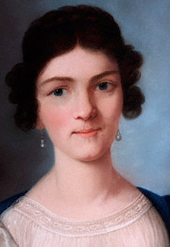Amalie Sebald

Amalie Sebald (born August 24, 1787 in Berlin ; † January 4, 1846 in Berlin) was a German singer and was considered Beethoven's " immortal lover " at the beginning of the 20th century .
Life
Amalie Sebald was a daughter of the alto von Sebald, nee Schwadke, and the judiciary Karl Christian August Sebald. Like her sister Auguste, who later married the evangelical clergyman Carl Ritschl, she was a soprano. In the files of the Singakademie the mother is noted for the year 1791, the daughters 1801 and 1802; The three women first appeared as soloists in 1794, 1803 and 1804.
Beethoven met Amalie Sebald in the summer of 1811 in the seaside resort of Teplitz ; she had come with Countess Elisabeth von der Recke . It was then that the composer's heart won and she met her again in Teplitz in 1812. Amalie Sebald later married on October 17, 1815, the Berlin judicial councilor Ludwig Krause (around 1781-1825), whom she survived while Beethoven remained illegitimate and five years later told Gianastasio de Rio that he had little hope of finding the wife, with whom he fell in love to win for himself.
Amalie Sebald apparently still worked as a singing teacher after her marriage. Lili Parthey was one of her students and she gave Queen Luise a medallion with hair for her birthday in 1817 .
Beethoven's love letter
The Beethoven researcher Wolfgang Alexander Thomas-San-Galli believed in 1910 that he had found the addressee of the famous letter to the “Immortal Beloved” in Amalie Sebald, a letter that Beethoven wrote on 6/7. July 1812 in the Bohemian spa town of Teplitz had written to a stranger. Thomas-San-Galli's thesis is no longer discussed today.
literature
- Ludwig Nohl , Beethoven's last love. In: The Salon for Literature, Art and Society , Volume 1 (1880), pp. 537-545 ( digitized version )
- Wolfgang Alexander Thomas-San-Galli , Beethoven and the Immortal Beloved: Amalie Sebald, Goethe, Therese Brunswik and others , Munich 1910
- Arnold Schering , To the portrait of Amalie Sebald. In: New Beethoven Yearbook , ed. by Adolf Sandberger , vol. 5 (1933), p. 5f.
- Klaus Martin Kopitz , Rainer Cadenbach (Eds.) A. a .: Beethoven from the point of view of his contemporaries in diaries, letters, poems and memories. Volume 2: Lachner - Zmeskall. Edited by the Beethoven Research Center at the Berlin University of the Arts. Henle, Munich 2009, ISBN 978-3-87328-120-2 , pp. 877-879.
Individual evidence
- ^ A Dictionary of Music and Musicians , Vol. 3, p. 454
- ^ Georg Schünemann: The Singakademie zu Berlin: 1791-1941 . Bosse, 1941, OCLC 185164717 , p. 119 ( limited preview in Google Book Search [accessed December 31, 2016]).
- ^ Adolph Bernhard Marx, Ludwig van Beethoven. Life and Creation , 5th edition, 2nd part, Berlin 1901, p. 295
- ↑ Hubertus Büschel: Subject love of cult around German monarchs; 1770-1830 . In: Publications of the Max Planck Institute for History . Vandenhoeck and Ruprecht, Göttingen 2004, ISBN 3-525-35875-X , p. 342 ( limited preview in Google Book Search [accessed December 31, 2016]).
Web links
- Literature by and about Amalie Sebald in the catalog of the German National Library
| personal data | |
|---|---|
| SURNAME | Sebald, Amalie |
| BRIEF DESCRIPTION | German singer and singing teacher |
| DATE OF BIRTH | August 24, 1787 |
| PLACE OF BIRTH | Berlin |
| DATE OF DEATH | January 4, 1846 |
| Place of death | Berlin |
